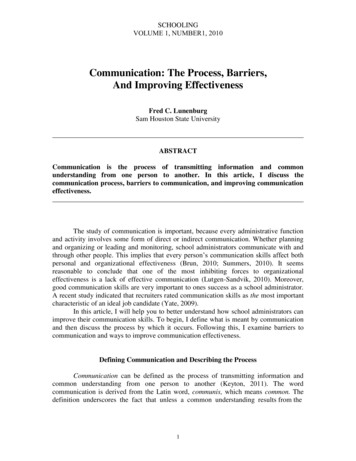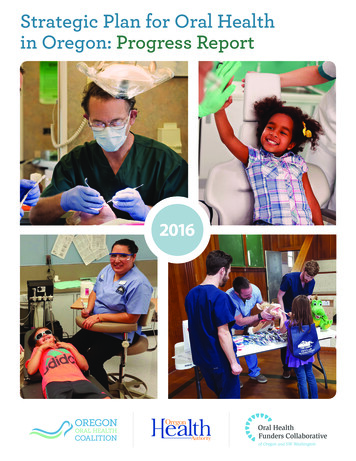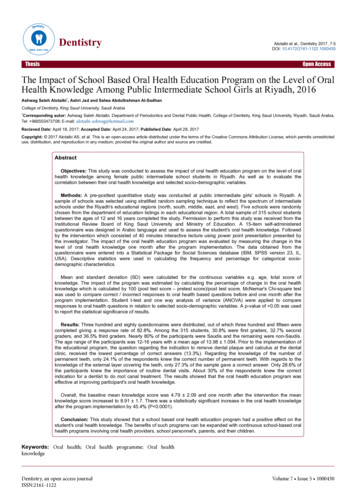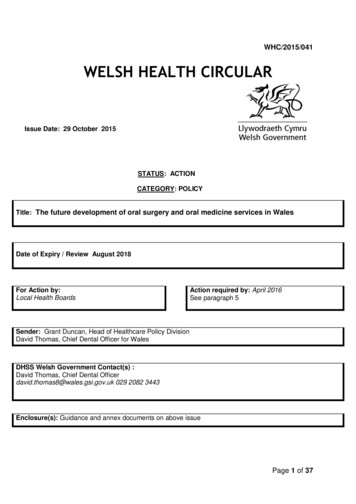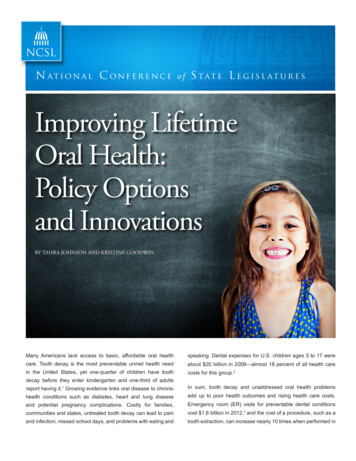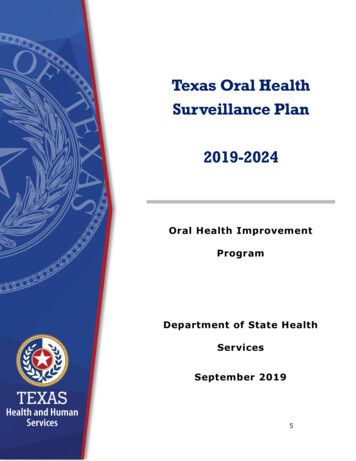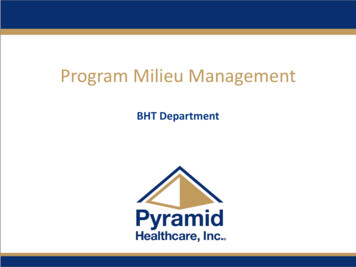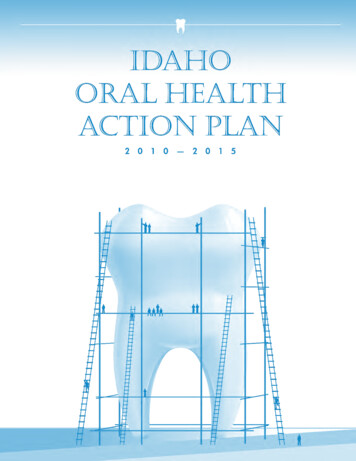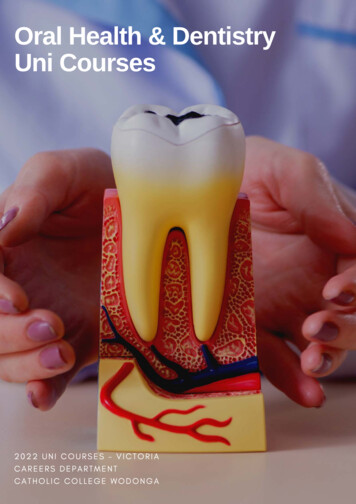
Transcription
ADDRESSING BARRIERS TO ORAL HEALTHAND HEALTH CARE FOR ADULTS WITHINTELLECTUAL AND DEVELOPMENTALDISABILITIES IN NEW JERSEY,FIVE-YEAR PLANMarch 2020AUTHORS:Heather Koball, PhD, Co-Director, National Center for Children in Poverty;KavitaAhluwalia, Associate Professor of Dental Medicine & Director of Postdoctoral Program inDental Public Health at Columbia University College of Dental Medicine;Suma Setty, MPH,Senior Research Associate, National Center for Children in Poverty;Chelsea Fosse, DMD,MPH, Dentist & Dental Public Health Resident, NYC Health HospitalsCOLUMBIA COLLEGE OF DENTAL MEDICINE AND THE NATIONAL CENTER FORCHILDREN IN POVERTY, BANK STREET COLLEGE OF EDUCATION0
Addressing Barriers to Oral Health and Health Care for Adults with Intellectual and DevelopmentalDisabilities in New Jersey, Five-Year PlanTable of ContentsBackground . 3Project Overview . 4Challenges to Maintaining Oral Health . 5Barriers to Daily Oral Care . 5Barriers to Accessing Professional Dental Care . 6Barriers at the Point of the Dental Encounter: Families’ Perspectives . 7Stakeholder Feedback . 9A. Policy Gaps and Opportunities to Improve Oral Health and Healthcare for People with IDD . 11A.1 Statewide Dental Plan. 11A.1 Recommendation . 11A.2 New Jersey Medicaid Coverage for People with IDD . 11A.2 Recommendation . 13A.3 Limitations of Medicaid Coverage . 13A.3 Recommendation . 14A.4 Lack of Data on Unmet Dental Needs. 14A.4 Recommendation . 14A.5 General Anesthesia: Data Analysis . 15A.5 Recommendation . 15A.6 General Anesthesia: Hospitals’ Role . 15A.6 Recommendation . 16A.7 Community Water Fluoridation . 16A.7 Recommendation . 17A.8 Partnering with Allies on Shared Policy Priorities . 17A.8 Recommendation . 18B. Training for Oral, Medical, and Helping Professionals to Care for People With IDD . 19B.1 Behavior Guidance to Reduce Need for Sedation . 20B.1 Recommendation. 20B.2 Expanding the Evidence Base of Best Practices for Behavioral Guidance . 20B.2 Recommendation. 21B.3 Loan Repayment Programs for Dentists who Treat People With IDD . 21B.3a Recommendation. 221
Addressing Barriers to Oral Health and Health Care for Adults with Intellectual and DevelopmentalDisabilities in New Jersey, Five-Year PlanB.3b Recommendation . 22B.4 Oral Health Training for Direct Support Professionals (DSPs) . 22B.4 Recommendation. 22B.5 Integrating Oral Health with Primary Medical Care . 22B.5 Recommendation: . 23B.6 Transition to Adult Dental Care . 23B.6 Recommendation. 24C. Community Awareness of the Importance of Oral Health and Access to Oral Health Services . 25C.1 Trusted Sources of Information . 25C.1 Recommendation. 26C.2 Finding Dentists . 26C.2 Recommendation. 28Conclusion . 28Oral Health Task Force . 28Recommendation. 28Report Authors. 29Special Thank You . 29Appendices: Appendix A: Attendees at Oral Health Summit, October 16, 2019Appendix B: Attendees at Managed Care Organization Meeting, January 31, 2020Appendix C: Instructions and Questions for Small Group Discussions During October SummitAppendix D: Discussion Questions for January 31 Managed Care Organization MeetingAppendix E: Recommendations for Administering a Survey of Dental Providers in New JerseyAppendix F: Descriptions of Organizations Listed in ReportThis work is supported with a grant funded by the New Jersey Council on DevelopmentalDisabilities, in part by grant number 2001NJSCDD-02, from the U.S. Administration for CommunityLiving, Department of Health and Human Services, Washington, D.C. 20201. Grantees undertakingprojects with government sponsorship are encouraged to express freely their findings andconclusions. Points of view or opinions do not, therefore, necessarily represent official ACL policy.2
Addressing Barriers to Oral Health and Health Care for Adults with Intellectual and DevelopmentalDisabilities in New Jersey, Five-Year PlanBackgroundIn September 2018, the New Jersey Council on Developmental Disabilities (NJCDD) awardedColumbia University College of Dental Medicine and the National Center for Children in Poverty(NCCP) an 18-month grant to identify barriers to oral health and health care for people withintellectual and developmental disabilities (IDD) and to develop a five-year advocacy plandesigned to improve oral health and health care for people with IDD in New Jersey. The projectfocuses on oral health care delivery systems, accessing oral health care, and prevention of oralhealth issues among adults with IDD.IDD is defined as a disability that begins during childhood, is lifelong, and substantially limits anindividual’s functioning in several major life activities (e.g., self-care, learning, mobility,communication, self-direction, economic self-sufficiency, and the ability to live independently).Examples of diagnoses associated with IDD include Down Syndrome, Autism SpectrumDisorders, and some presentations of cerebral palsy.NJCDD is a federal and state-funded organization in New Jersey, whose members includepeople with IDD and immediate family members and guardians of people with IDD. NJCDDreviews service systems for people with IDD and advises policymakers on the best ways tomodify those systems to better serve the population. NJCDD also provides a platform forindividuals, family members, advocates, and public and private agencies to develop coordinatedadvocacy to advance the rights and opportunities of New Jersey residents with IDD andimprove their quality of life.This project was inspired by NJCDD member concerns about accessing comprehensive oralhealth care for family members with IDD or for themselves. The research literature supportstheir concerns with evidence of large disparities in oral health status and healthcare access andutilization for people with IDD. People with IDD are more likely to have poorer oral hygiene,increased prevalence of periodontal disease, higher rates of edentulism (i.e., tooth loss), andincreased untreated dental caries (i.e., cavities) than the general population. 1,2,3 Poor oralhealth is linked to a number of health conditions, including diabetes, hypertension, and othercardiovascular, endocrine, and respiratory diseases. 4 Oral health is critical to overall well-beingand wellness; poor oral health can negatively affect quality of life. Oral pain can interfere withthe functions of daily living, including eating, which, in turn, impacts diet and nutrition,sleeping, and conversing. Oral disease and dysfunction result in low self-esteem, alter speech,and affect social interactions, appearance, and behavior—all of which are vitally important for1Anders, P.L. & Davis, E.L. (2010). Oral health of patients with intellectual disabilities: A systematic review. SpecCare Dentist 30(3): 110-117.2Buda, L.V. (2016). Ensuring maintenance of oral hygiene in persons with special needs. Dent Clin N Am 60: 593604.3Morgan, JP, Minihan, PM, Stark PC, Finkelman, MD, Yantsides, KE, Park, A, Nobles, CJ, Tao, W, & Must, A. (2012).The oral health status of 4,732 adults with intellectual and developmental disabilities. JADA 143(8): 838-846.4Rautemaa, R., Lauhio, A., Cullinan, M.P., & G.J. Seymour. (2007). Oral infections and systemic disease—Anemerging problem in medicine. Clinical Microbiology and Infection 13(11): 1041-1047.3
Addressing Barriers to Oral Health and Health Care for Adults with Intellectual and DevelopmentalDisabilities in New Jersey, Five-Year Planpeople living with IDD. 5,6 Since a significant proportion of people living with IDD may not beable to verbalize how disease impacts them, regular access to dental services and delivery ofcomprehensive oral health services are vital for people with IDD. Efforts to prevent oraldiseases in this population would decrease the likelihood of serious dental and oral healthsequelae, improve treatment efficiency, reduce the cost of treatment, and would improve theoverall quality of life for people with IDD and their families.Project OverviewData sourcesThe data collection and research methods included:1.2.3.4.focus groups and interviews with 16 caregivers of people with IDDfocus groups and conversations with 16 people with IDDa review of the research literaturea survey of dentists in New Jersey5. key informant interviews with 49 policymakers, insurance representatives, advocates,medical professionals, service providers, and researchers who are involved in providingdental care to people with IDD in New Jersey and nationallyAs part of the project, the team also created a directory of dentists who serve patients withIDD, which combines responses from the survey of dentists and multiple online dentaldirectories. The directory will be released to NJCDD in 2020.Project Focus: Adults With IDDInitial field research for this project suggested that although children with IDD face difficultiesaccessing adequate dental care, adults with IDD typically face additional challenges in accessingand utilizing dental care. 7 Unlike other dental specialties, pediatric dentists receive training intreating and managing patients with special needs. Furthermore, children are more likely thanadults to be on their parents’ private dental insurance, and finally, several organizations in NewJersey already focus on improving access to oral health care for children with IDD. This worksought to learn from and complement these efforts in order to provide a roadmap to improveoral health for adults with IDD.5Rapalo, D.M., Davis, J.L., Burtner, P., & Bouldin, E.D. (2010). Cost as a barrier to dental care among people withdisabilities: A report from the Florida behavioral risk factor surveillance system. Spec Care Dentist 30(4): 133-139.6U.S. Department of Health and Human Services. (2000). Oral health in America: A report of the Surgeon General.Rockville, MD: U.S. Department of Health and Human Services, National Institute of Dental and CraniofacialResearch, National Institutes of Health.7Stiefel, D. J. (2002). Dental care considerations for disabled adults. Spec Care Dentist 22(3):26S-39S; Chi, D.L.(2015). Medical care transition planning and dental care use for youth with special health care needs during thetransition from adolescence to young adulthood: a preliminary explanatory model. Matern Chil Health J 18(4):778788.4
Addressing Barriers to Oral Health and Health Care for Adults with Intellectual and DevelopmentalDisabilities in New Jersey, Five-Year PlanWe focused on the nearly 25,000 adults who are eligible to receive services through theDivision of Developmental Disabilities (DDD) in New Jersey. 8 To access DDD services, an adultmust be a NJ resident, 21 or older, have a documented IDD, and be a U.S. citizen or legalpermanent resident. DDD services are provided for people who live in group homes, supportivehousing, state-run developmental centers, or with their families. 9Adults who receive DDD services must also qualify for Medicaid, thus the project focused onadults with IDD who are eligible for Medicaid. Adults with IDD may also have private insurance,may have family members who pay out of pocket for dental care, or may be dual eligible forMedicare. While Medicaid, as a state-run program in New Jersey, provides dental benefits foradults, federally run Medicare does not currently contain a dental benefit.Challenges to Maintaining Oral HealthThe primary data (interviews with family caregivers, self-advocates, and key informants and thesurvey of dentists) and review of the research literature suggested multiple factors that impactthe oral health of adults with IDD.Families and people with IDD described both barriers to daily oral care and to accessingprofessional dental care. While regular professional dental care is important for the preventionand management of dental disease and dysfunction, daily oral care— including tooth brushing,flossing and rinsing—can prevent dental diseases, reduce disease severity, and mitigate manyof the quality of life and health declines associated with dental diseases.Barriers to Daily Oral Care The severity and type of an individual’s disability: An individual’s functional and healthneeds can affect their susceptibility to oral disease and their adherence to routine dailyoral care (e.g., tooth brushing). 10 Some caregivers reported difficulty ensuring that theirfamily member with IDD brushed adequately because of sensitivity to toothbrushes orother cleaning tools in the mouth. Family support: An individual’s level of family support can influence the quality ofpreventative and daily oral care practices at home and the receipt of regular dentalvisits. Whether an adult with IDD has an involved family caregiver can also influencetheir ability to communicate oral and dental needs with oral health professionals oradvocate for themselves. Place of residence: People with IDD who live with their families may have poorer accessto professional dental cleanings than those who live in group homes or state-rundevelopmental centers. Staff at group homes and state-run developmental centers have8“About DDD.” Division of Developmental Disabilities, Department of Human Services. Retrieved t/.9“Where to Apply for Services: Eligibility for Services.” Division of Developmental Disabilities, Department ofHuman Services. Retrieved from y/.10Daily oral care includes daily routine oral care such as tooth brushing, flossing, denture care and cleaning of theoral soft tissues.5
Addressing Barriers to Oral Health and Health Care for Adults with Intellectual and DevelopmentalDisabilities in New Jersey, Five-Year Planaccess to dentists able to treat patients with IDD and are required to take individuals totheir dental appointments. Family caregivers may have more capacity to support dailyoral health care (e.g., tooth brushing) than aides at a group home or center, who maynot receive any training on daily oral care.“When [my brother] first moved into the group home, he started having cavities, and then ourfamily instructed [group home] staff to be more hands-on when he brushes. The staff were veryresponsive, and he started having fewer cavities.” – New Jersey caregiver of her adult brotherwith IDDBarriers to Accessing Professional Dental CareWhile the Commission on Dental Accreditation (CODA), which sets the national minimalcompetency for dental education, indicates that dental students must have worked with andtreated a person with special needs, special needs are broadly defined to include not onlypeople with IDD, but also older adults and people with medical comorbidities. As a result,dentists are not specifically trained in treating and managing patients with IDD. Lack of expertise in caring for patients with IDD: According to the research literature,many dentists do not treat patients with IDD, particularly adults, because they feelunprepared or inexperienced in treating adults with IDD. 11,12 Interviews with familiesconducted for this project confirmed that they had difficulty finding dentists who weretrained to treat people with IDD. People who live in less densely populated areas of NewJersey, like southern New Jersey, may have even fewer choices for dentists. Lack of providers who accept Medicaid: Most adults with IDD receive dental coveragethrough Medicaid. 13 Families reported particular difficulty in finding providers whoaccept Medicaid and are able to provide care for people with IDD. Family membersreported paying out of pocket for dental care because the wait time to see a dentistwho participates in Medicaid was too long, an appropriate dentist was too far away, or adentist who could provide high-quality care did not accept Medicaid. In other cases,some people with IDD reported that they were unable to receive some types of dentalprocedures because they are not covered by Medicaid and they cannot afford to pay forthem out of pocket.“I wish more dentists would accept Medicaid. I got all these offers from area dentists butmaybe some of them don’t know how to deal with people with special needs. I think there issome prejudice out there too they don’t want their practice to cater to them.” – New Jerseycaregiver with 34-year old son with IDD and physical disabilities.11Bayarsikhan, Z., Cruz, S., Neff, J., & Chi, D. (2015). Transitioning from pediatric care to adult care for adolescentswith special health care needs: Dentist perspectives (part 2). Pediatr Dent. 37(5):447-451.12Davis, M.J. (2009). Issues in access to oral health care for special care patients. Dent Clin N Am 53: 169-181.13Overview of health insurance for people with intellectual disabilities. Centers for Disease Control andPrevention. Retrieved from may20.pdf.6
Addressing Barriers to Oral Health and Health Care for Adults with Intellectual and DevelopmentalDisabilities in New Jersey, Five-Year Plan Lack of awareness about oral issues among non-dental health providers: Key informantsreported that medical doctors are often unaware of the behavioral issues that canmanifest in non-verbal patients experiencing oral pain, and medical doctors did notroutinely “look in the mouth” of patients with IDD. This sometimes led toovermedication for behavioral issues that could be addressed through reducing oralpain or providing appropriate dental care.Dentists are not routinely trained to provide services in operating rooms (OR) and receiving ORprivileges can be difficult for dentists. However, general anesthesia provided in an OR may berequired to provide oral health care to some adults with IDD if they are unable to cooperatewith oral health care procedures or if they require airway protection during dental care. Long waits for general anesthesia: People with IDD experience particularly long waits ifthey require general anesthesia for dental care; wait times for dental care under generalanesthesia in a hospital OR can be as long as two years. In other cases, caregivers paythousands of dollars out of pocket for general anesthesia because of difficultiesassociated with getting insurance to cover general anesthesia services. Lack of coverage for sedation dentistry: Some caregivers seek sedation dentistry (a“lighter sleep” than general anesthesia) for their family members with IDD who facebehavioral and emotional challenges in receiving dental care; 14 however, familymembers reported that they typically had to pay out of pocket for this service.Barriers at the Point of the Dental Encounter: Families’ Perspectives Dental Fear and Anxiety: Some caregivers experience difficulties in getting their familymember with IDD to the dentist because of behavioral or mobility issues. Some peoplewith IDD fear dentists and dental visits. This fear can be exacerbated by previous badexperiences and/or by heightened sensitivity to dental procedures (e.g., vulnerablepositioning, bright lighting, strong scents, unfamiliar or unpleasant sounds, etc.). Somepeople with IDD reported discomfort seeing dentists who they perceive as treating themdisrespectfully or who do not explain issues clearly to them.“First [I’d like a dentist] who treats [my son] like a person with kindness and compassion.Also, someone who isn’t afraid of him and comes up with innovative ways to examine him.Lastly, they do not judge us for his behavior and realize and understand it isn’t our fault and14For the purposes of this report, we use sedation dentistry to mean sedation that does include unconscioussedation or general anesthesia. General anesthesia faces much stricter regulations and requirements than otherforms of sedation, including that only an anesthesiologist can administer general anesthesia, and three traineddental personnel, including the doctor, are required to be in the room, with one constantly documenting andmonitoring vital signs. See “Sedation Dentistry and Insurance Reimbursement,” (14 November 2016). Retrievedfrom y-and-insurance-reimbursement/7
Addressing Barriers to Oral Health and Health Care for Adults with Intellectual and DevelopmentalDisabilities in New Jersey, Five-Year Planno lectures on autism unless it’s directly related to helping his oral hygiene.” – New Jerseycaregiver of adult son with IDD Long waiting room times: Informants report that long waiting room times to see adentist at a clinic or hospital exacerbate anxiety about going to the dentist, especiallywhen other patients and their families in the waiting room are not understanding abouttheir needs.“I would like them to be fast, no waiting too long. The longer they wait the moreagitated they get. Just to have everything at hand, and do it quick and fast it’s hardwhen you have to wait in the waiting room and then you have to wait in the examroom, and it’s important to have everything ready.” – New Jersey caregiver of childwith Autism Spectrum Disorder Lack of physical accessibility or sensory-friendly environments: Many dental clinics donot have wide hallways or elevators or the ability to treat patients in theirwheelchairs. 15 Caregivers also reported that the waiting room environments (e.g., brightlights) exacerbate sensory difficulties for some patients with IDD, resulting in behavioralissues.“What would have been better if the entry point was specifically designed for people withIDD, with low stimulation. We had to sit there and wait for like an hour with all the otherpeople. The biggest barrier is the waiting room and lumping us all together with the generalpopulation. It’s difficult. I am 100% for inclusion, but when it comes to dental and medicalcare, it should be designed specifically for their needs. My daughter is nonverbal.” – NewJersey caregiver of adult daughter with severe IDD Lack of trained dental office staff: Families reported feeling uncomfortable or anxious insome dentists’ offices because the front office staff were not trained and/orcomfortable working with patients with IDD.“It would help if the receptionists really understood autism and realized that when we call withrecommendations prior to the examination that they take us seriously and relay the informationeither to the assistant or the doctor. Prior planning makes the visit go much smoother. We don’tusually deal with a hygienist but they should also be compassionate, knowledgeable aboutautism and not afraid to treat people with it. If their dentist is willing to treat kids like ours thanthe hygienists should have special training too.” – New Jersey caregiver of 18-year-old son withIDD15Rouleau, T., Harrington, A., Brennan, M., Hammond, F., Hirsch, M., Nussbaum, M., & Bockenek, W. (2011).Receipt of dental care and barriers encountered by persons with disabilities. Spec Care Dentist 31(2): 63-67.8
Addressing Barriers to Oral Health and Health Care for Adults with Intellectual and DevelopmentalDisabilities in New Jersey, Five-Year PlanStakeholder FeedbackThe research culminated in two stakeholder meetings organized by the project team:(1) a one-day Oral Health summit in October 2019 that brought together 45 stakeholder andleaders within the oral health community, the broader medical community, the public healthsector, and social service agencies (the attendee list is in Appendix A) and (2) a half-day meetingin January 2020 to discuss oral health for adults with IDD with all five of New Jersey’s MedicaidManaged Care Organizations (MCOs), which contract with the state Medicaid office to providedental benefits to adults with Medicaid coverage, including those with IDD. The state agenciesthat oversee Medicaid and services for adults with IDD also attended (i.e., NJ Division forDevelopmental Disabilities, the NJ Division of Medical Assistance and Health Services, the NJDepartment of Human Services, and NJ ’s state dental director) (see Appendix B for theattendee list).The goal of both these meetings was to gather feedback from key stakeholders and expertsabout prioritizing advocacy activities that would lead to improved oral health and health carefor people with IDD. At the October summit, the project team presented their findings aboutbarriers to oral health culled from the focus groups, literature review, survey of dentists, andkey informant interviews. The project team identified potential foci for advocacy within stateand federal policy, training of the oral health workforce, and community education on oralhealth (see Appendix C for the list of questions posed to the summit participants). The summitattendees discussed specific issue areas within small groups, then discussed each issue area asa large group, and each attendee voted for the advocacy activities within each issue area thatthey felt should be prioritized to reduce barriers to oral health for adults with IDD. The projectteam reviewed and analyzed the notes from the small group breakout sessions and the votes ofthe stakeholders to inform the advocacy goals presented in this report.The January meeting focused more narrowly on issues related to Medicaid and access to oralhealth care.
Oral health in America: A report of the Surgeon General. Rockville, MD: U.S. Department of Health and Human Services, National Institute of Dental and Craniofacial Research, National Institutes of Health. 7. Stiefel, D. J. (2002). Dental care considerations for disabled adults.
